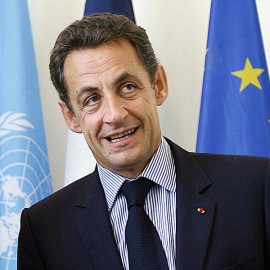
David Cameron is not the only centre-right pretender to government office. Across the Channel in France, Nicolas Sarkozy appears to be making ground as a leading contender in the French presidential elections due next year.
He has courted controversy, deliberately adopting a tough, even brutal approach as interior minister. Far from hugging a hoodie, he would blast them off the streets with a water cannon.
He gave an important and interesting speech last month to the Friends of Europe group in Brussels (read it here, in French), three days before David Cameron spoke about his version of foreign policy in London. That makes the contrast between the two even more striking.
The fact that Sarkozy’s speech was about the EU whereas Cameron’s was about America possibly tells you all you need to know about the respective outlooks of the two of them. But there’s more. Sarkozy did not only talk about Europe, he said “I have always wanted to believe in a political Europe. I do not want to stop believing in it.” (My bad translation, I’m afraid.) Can you imagine David Cameron saying he believes in a political Europe? It’s hard to imagine him saying he believes in a political anything.
Sarkozy is scarred, of course, by the recent experience of the No vote on the constitutional treaty. He can’t resist the observation that his own party was united in favour of a Yes vote (meaning, but not saying, that a lot of the socialists campaigned against) but accepts now that the result is what it was. “I will not be one of those who tell the French people that they misunderstood the question they were asked.” Of course not, he hopes to ask them a question about himself next spring.
If that is the case, what is to be done? What should believers in a political Europe now look for?
His answer comes in two parts. The idea of a fundamental document (whether it is called a constitution or not doesn’t matter) must be brought back, as the result of “a great democratic debate and not merely diplomatic exercise, limited to quiet negotiations among experts or the initiated.” He suggests that this might take place after the European elections in 2009, and he is quite clear that this process, done properly, will take time.
Before then, therefore, something else must be done. Some changes are needed straightaway. He proposes, for this role, a mini-Treaty. It can be negotiated quite quickly and easily by governments, he hopes, and ratified by parliaments, as were the treaties of Nice and Amsterdam. He is dead against risking another referendum.
And in his mini-Treaty, what would there be? Only the essential provisions, but there are quite a lot of them:
- The extension of majority voting and codecision, particularly in justice and home affairs
- The rule of double majority (i.e. the new voting weights)
- The election of the Commission president by the Parliament (he wants the parties to enter the elections of 2009 with nominated candidates for president)
- The role of national parliaments in enforcing the principle of subsidiarity
- A permanent chair of the European Council
- The double-hatted foreign minister
- The citizens’ right of initiative
- The possibility of reinforced cooperation
- Giving the EU legal personality
A better question, which takes a bit more work to answer, is what would be missing. The main things are these (but add any other missing items you spot in comments at the end of this blog posting):
- The charter of fundamental rights
- A catalogue of competences
- Open meetings of the Council of Ministers
- New competences in the areas of space, energy, etc
- The next steps in defence cooperation
- An overall simplification and clarification
There are two other issues which, he says, even the constitutional treaty dealt with inadequately and which need to be debated thoroughly. The first is the composition of the European Commission, the second is the continuing role of the national veto.
For the first of those, he would prefer to see a smaller, streamlined college of Commissioners chosen by its president (having him/herself been elected by the European Parliament). For the second, he suggests that some form of super-qualified majority among the member states might replace unanimity. Both of these are big issues, he acknowledges, and can’t be dealt with straightaway.
He is surely right that the adoption of a new political, even a new constitutional, order for Europe requires a proper public debate and understanding. The Convention was supposed to lead to this, but evidently it didn’t. There is a real question whether it is better to press on with the existing agreement, rewritten as necessary, or whether to opt for a simpler, short-term fix for the time being (in marketing-speak, this second option would be called “quick and dirty”).
Reasons for sticking with the existing agreement: it represents the broad political consensus in Europe as currently established – fifteen member states have already ratified; opening it up for extensive renegotiation would be much harder than Nicolas Sarkozy appears to imagine; a number of the things that he would be willing be drop are actually rather important necessary for improving the functioning of the Union.
Reason for dropping it: there is no way it could get through. Referendums will be necessary, and that is a huge risk.
The solution proposed by the UEF is that first, all the referendums should be held on the same day, which reduces if not eliminates the impact of national and temporary factors in the decision to be taken, and secondly, that the constitution should come into force in those member states which vote Yes, even if some others vote No. That is a solution that provokes other questions of its own. Whatever the outcome, the debate is not over.
